adrenal support
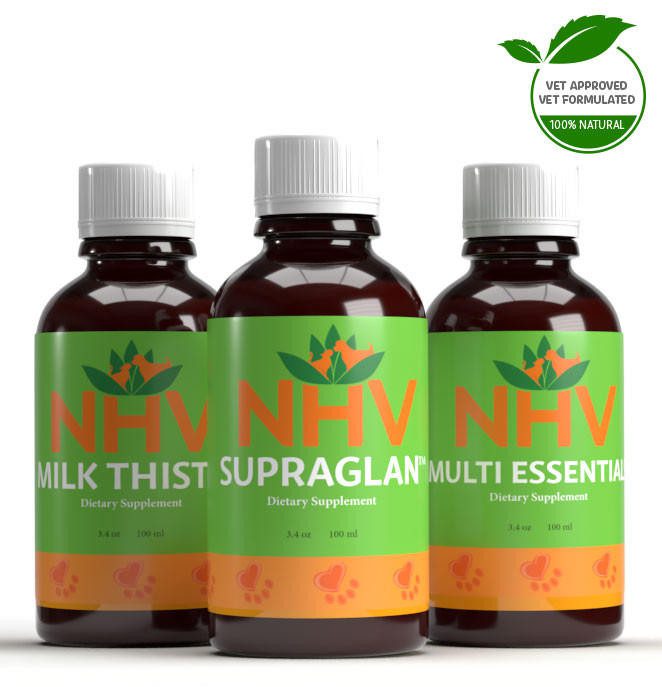
free shipping over $100 (USA & Canada)
1-877-937-4372 the pet expert hotline


When we talk about immunity and overall wellness in our pets, we often think of vaccinations, nutrition, or regular exercise. But one often-overlooked part of the body that plays a vital role in maintaining your pet’s health and immunity is the adrenal glands. These small but powerful organs are crucial in regulating your pet’s response to stress, energy levels, and immune function.
In this blog, we will explore the fascinating world of adrenal glands and pet immunity and discuss how to support your pet’s adrenal health naturally.
Your pet has two adrenal glands, one located on top of each kidney. Though tiny in size, they are responsible for producing essential hormones that influence many of the body’s systems. These hormones include:
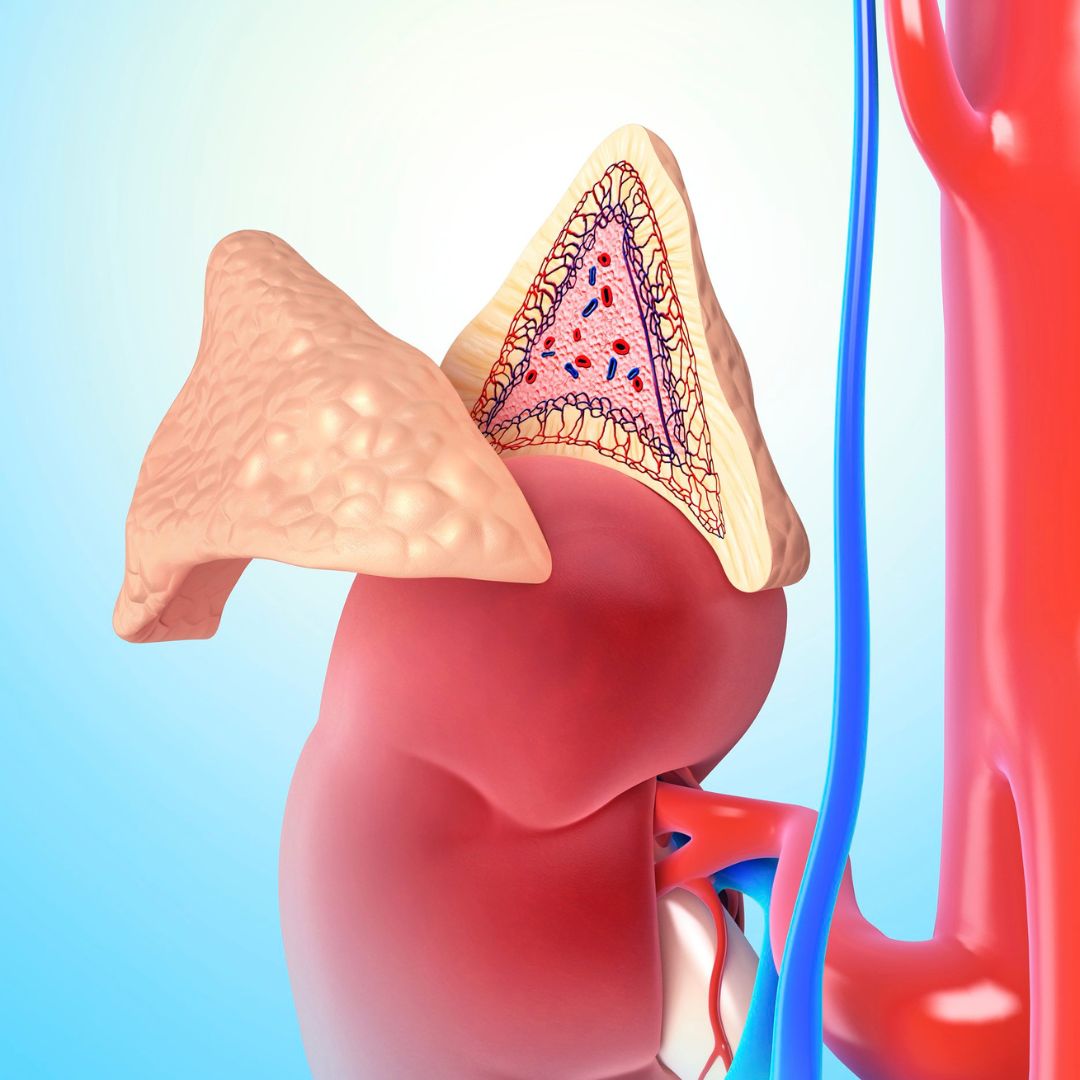
These hormones are crucial for your pet’s ability to respond to stress, maintain immune balance, regulate metabolism, and stay energized.
The adrenal glands don’t work in isolation, they’re part of a broader system known as the HPA axis (Hypothalamic-Pituitary-Adrenal axis), which controls your pet’s hormonal and stress responses.
Let’s look at three major areas impacted by adrenal function:
Cortisol, one of the main hormones produced by the adrenal cortex, plays a direct role in converting fats, proteins, and carbohydrates into usable energy. When adrenal function is disrupted, it can result in symptoms like fatigue, weight gain or loss, muscle weakness, or digestive issues.
One of cortisol’s key roles is to keep the immune system in check. While a healthy amount of cortisol helps modulate inflammation and immune responses, too much or too little can suppress the immune system, making pets more vulnerable to infections, allergies, and chronic illnesses.
Whether it’s environmental stress, separation anxiety, illness, or pain, the adrenal glands help your pet cope. Chronic stress can cause adrenal fatigue, which affects your pet’s resilience and recovery. In turn, this can disrupt sleep, digestion, and immune function.
Adrenal disorders are not uncommon in dogs and cats, and they can significantly compromise the immune system. Two of the most recognized conditions are Cushing’s disease and Addison’s disease.
Cushing’s disease occurs when the adrenal glands produce too much cortisol. Common signs include:
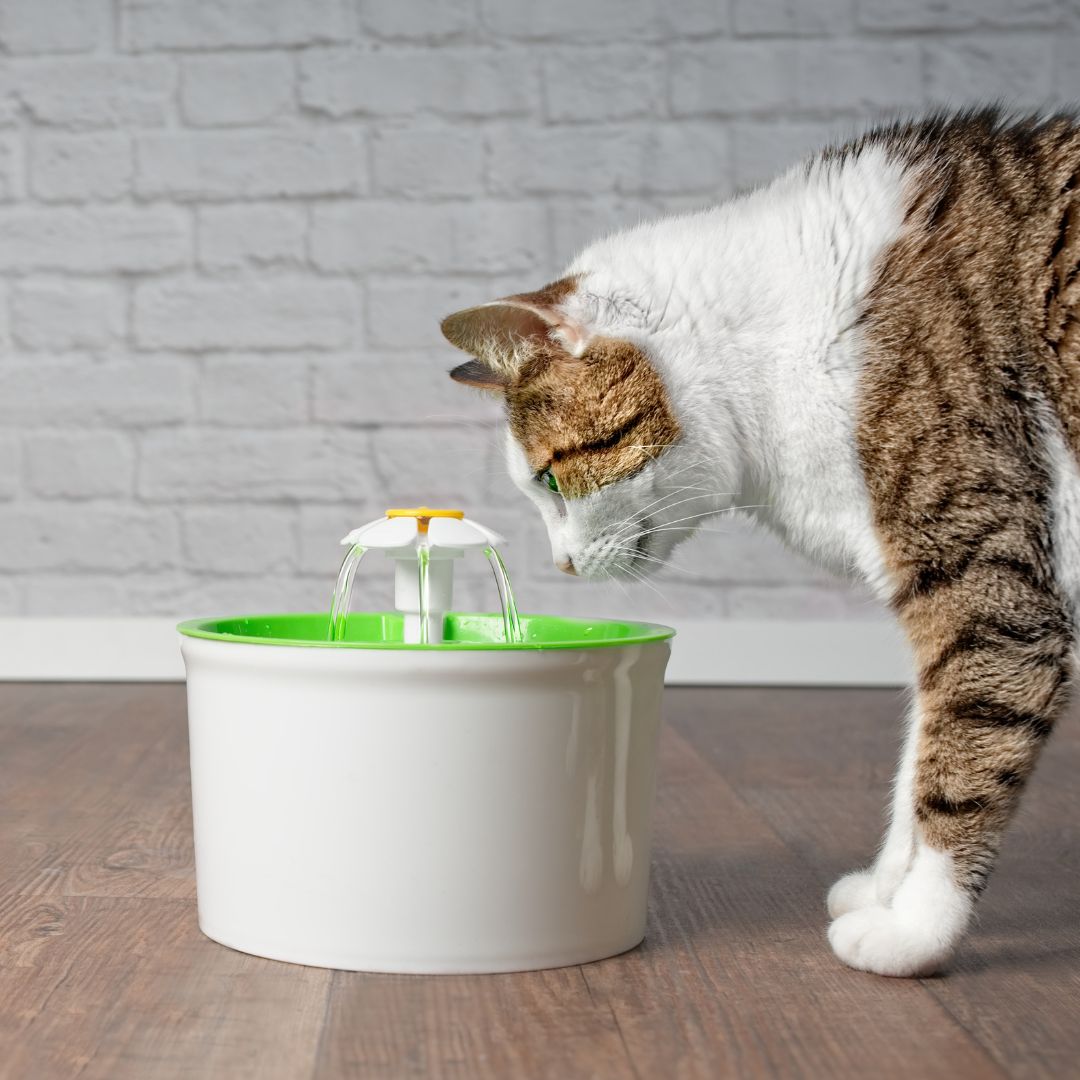
Excess cortisol suppresses immune responses, leaving pets more prone to bacterial, viral, or fungal infections. It also slows wound healing and increases inflammation throughout the body.
Addison’s disease, on the other hand, results from underactive adrenal glands, leading to a deficiency of cortisol and aldosterone. This can cause:
Because cortisol helps regulate immune responses, a lack of it can cause immune dysfunction, poor stress tolerance, and frequent illness. In severe cases, an Addisonian crisis can be life-threatening without prompt veterinary care.
Whether your pet has a diagnosed adrenal condition or you simply want to keep their endocrine and immune systems strong, there are several natural ways to support adrenal gland health.
Chronic stress is a leading contributor to adrenal imbalance. Consider the following tips:
A nutrient-dense, species-appropriate diet is essential for adrenal support. Focus on:

For pets with adrenal disorders, feeding smaller, more frequent meals can help stabilize blood sugar levels and reduce the workload on the adrenal glands, which are involved in regulating metabolism and stress responses.
At NHV, we’re passionate about using plant-based remedies to support wellness. For adrenal and immune health, here are a few standout products:
The adrenal glands and pet immune system are closely linked
The adrenal glands and pet immune system are closely linked. When the adrenal glands are functioning well, your pet is better able to handle stress, fight off infections, and maintain vitality. However, when they’re overworked or underperforming, it can lead to immune compromise, hormonal imbalances, and a host of health challenges.
If you suspect your pet may be experiencing adrenal dysfunction or if you want to explore natural ways to support their health, reach out to your veterinarian and explore NHV’s wide range of herbal support supplements designed to work alongside conventional care.
adrenal support

Supraglan, Milk Thistle & Multi Essentials
bundle and save with pet expert kits
3 month supply for a small to medium size pet.
What is it?
Our pet adrenal support is formulated to support and balance the adrenal glands, aid effective detoxification, and deliver vital nutrients to support metabolism and other important body processes.
How Does it Work?
Why Should I Trust It?
Supplements formulated by a holistic veterinarian and master herbalist.


What is it?
Our pet adrenal support is formulated to support and balance the adrenal glands, aid effective detoxification, and deliver vital nutrients to support metabolism and other important body processes.
How Does it Work?
Why Should I Trust It?
Supplements formulated by a holistic veterinarian and master herbalist.

Symptoms of overactive or underactive adrenal glands can often be mistaken for normal signs of aging. If your furkiddo is looking a little dull, doesn’t want to play or their appetite is all over the place, they may be suffering from an adrenal imbalance and malnutrition.
They are two small glands located next to the kidneys that work alongside the pituitary and hypothalamus glands to help regulate digestion, the immune system, and most importantly, the body’s response to stress.
When your furkiddo is stressed, their adrenal glands produce the hormones that stimulate a fight or flight response. This primal reaction can be a real lifesaver in many dangerous situations, but problems may develop when your dog or cat's adrenal system releases too much or too little of these glucocorticoid hormones. Stress can be triggered by many factors such as surgery, trauma, a change in routine, illness or even extreme weather.
Two of the most common adrenal gland disorders are Cushing’s disease (too much cortisol in the bloodstream) and Addison’s disease (too little cortisol and aldosterone).
Cushing's Disease or hyperadrenocorticism is caused by the overproduction of the hormone ACTH which is then released into the bloodstream and stimulates the adrenal glands to produce increased levels of cortisol. The adrenal glands can be pushed into overdrive from a few different causes, but most commonly, Cushing’s is caused by a tumor on the pituitary gland, known as an adenoma. As scary as this sounds, it may not be life-threatening, and if caught early, your pet may be able to maintain a good quality of life and minimize symptoms. If left untreated, this type of tumor may become metastatic and develop into cancer. The telltale signs of Cushing's disease often resemble normal aging due to symptoms like lethargy, weight gain, and a dull and dry coat. Also, age is most likely a factor as Cushing's does not usually develop in dogs until the age of ten. Although less common, Cushing’s (too much cortisol) can affect our feline friends too.
Certain breeds of dogs are more prone to Cushing’s, partly because certain breeds are more prone to stress. Poodles, Jack Russell Terriers, Beagles, and Dachshunds are a few dog breeds that are more likely to develop this kind of glandular disorder.
Addison’s Disease or hypoadrenocorticism occurs when the adrenal glands fail to produce enough hormones. Standard Poodles, Great Danes, Bearded Collies, Portuguese Water Dogs and West Highland White Terriers are some of the breeds that may be more susceptible to this glandular disorder. Addison’s Disease (too little hormone) is more common in young to middle-aged dogs and in some purebred cats.
There are two types of Addison’s Disease, primary and secondary. The primary type of Addison’s is essentially a rare autoimmune disorder where the immune system attacks the adrenal glands and damages the adrenal cortex. If your furry friend is battling tumors, other diseases or is taking vet-prescribed medications to treat Cushing's, these may be contributing factors to an underactive adrenal cortex, which leads to secondary Addison’s Disease caused by a pituitary gland tumor, long-term exposure to steroids or a side effect of suddenly pausing a medication.
The symptoms of adrenal disorders can be similar to various other health conditions in pets so your vet may recommend some in-depth diagnostic tests like a CBC, a chemistry panel, electrolyte tests and ACTH-stimulation tests to investigate your furkiddo’s symptoms.
For adrenal disease in cats or dogs with possible malnutrition (from diarrhea and excessive urination), we'd suggest adding NHV’s Adrenal Super Support and Nutritional Balance Kit to their daily meals. This bundle of natural remedies contains Supraglan, Milk thistle and Multi Essentials which have been specifically formulated for pets to gently re-balance the adrenal glands, reduce inflammation, and eliminate toxins.
An adrenal gland disorder impacts so many areas of the body. We would recommend a holistic pet adrenal support that connects and aids each of the affected areas while minimizing side effects to help your little one get their health back on track. Suplaglan is an all-natural blend of herbs specially formulated to focus on all areas affected by glandular disorders like Cushing’s or Addison's Disease. Wild yam helps restore hormone balance, licorice encourages hormone production, and borage naturally stimulates the endocrine system to rebalance adrenal cortex function and support a calmer body and mind. In addition to helping the adrenal and endocrine system, Suplaglan also contains herbs that support the kidneys, liver, and immune system, which we know are vital to maintaining a healthy body. Milk Thistle provides additional support to the liver, kidneys, and is known to encourage cell regeneration. And Multi Essentials help replenish vital nutrients that your pet may have lost from increased urination, diarrhea and a fluctuating metabolism (from unstable hormone levels).
Your pet’s health means everything to us. For our pet adrenal support kits, we have worked with a holistic veterinarian and a master herbalist to formulate gentle yet effective remedies to focus on the areas of the body most affected by Cushing’s and Addison’s disease. For any questions or concerns about your little one’s stress levels or adrenal health, don’t hesitate to reach out to an NHV Pet Expert - we are here to help!
Made with the finest, organically grown, or ethically harvested herbs. Made specifically for pets, vet-formulated and vet approved.
Supraglan
Milk Thistle
Multi Essentials
Select your pet's weight to determine the correct dose.
To be taken twice daily. Determine your pet’s weight and then use the easy chart below to determine the correct dose. This is the minimum dosage.
Pet's Weight Dosage
0 - 15 lb = 0.5 ml
16 - 30 lb = 1.0 ml
31 - 45 lb = 1.5 ml
46 - 60 lb = 2.0 ml
61 - 75 lb = 2.5 ml
Over 75 lb = 3.0 ml
For small animals (rabbits, ferrets), avians and reptiles use 1 drop for every 2 lb of body weight.
How to Administer
Shake well before use. The easiest method is to use the dropper provided and place the drops into your pet’s food or favorite treat. You can also use the dropper and squirt directly into the pet’s mouth. Some pets can be finicky, if this occurs consider hiding the drops in foods most pet’s love such as fish, chicken or yogurt or a favorite treat. If your pet only eats dry food then soak a few kibbles at feeding time.
For Best Results
Herbal dietary supplements are beneficial to the health and well-being of your pet and are safe for long-term use. Every pet responds to natural herbal supplements differently, therefore it is important to be consistent and administer the product daily. Supplements generally take two to four weeks to take effect, however this will vary from one animal to the next.
Product Storage
All NHV Natural Pet Products are pure herbal extracts and contain no artificial additives, preservatives or coloring. Shelf life after opening is 6 months and must be refrigerated after opening.
Cautions and Contraindications
Do not use Supraglan in pregnant or nursing animals. Speak to your vet before using our products. A second visit is recommended if your pet’s condition does not improve, or deteriorates after continued use of the supplements.
All information provided by NHV Natural Pet Products is for educational purposes only.
Symptoms of overactive or underactive adrenal glands can often be mistaken for normal signs of aging. If your furkiddo is looking a little dull, doesn’t want to play or their appetite is all over the place, they may be suffering from an adrenal imbalance and malnutrition.
They are two small glands located next to the kidneys that work alongside the pituitary and hypothalamus glands to help regulate digestion, the immune system, and most importantly, the body’s response to stress.
When your furkiddo is stressed, their adrenal glands produce the hormones that stimulate a fight or flight response. This primal reaction can be a real lifesaver in many dangerous situations, but problems may develop when your dog or cat's adrenal system releases too much or too little of these glucocorticoid hormones. Stress can be triggered by many factors such as surgery, trauma, a change in routine, illness or even extreme weather.
Two of the most common adrenal gland disorders are Cushing’s disease (too much cortisol in the bloodstream) and Addison’s disease (too little cortisol and aldosterone).
Cushing's Disease or hyperadrenocorticism is caused by the overproduction of the hormone ACTH which is then released into the bloodstream and stimulates the adrenal glands to produce increased levels of cortisol. The adrenal glands can be pushed into overdrive from a few different causes, but most commonly, Cushing’s is caused by a tumor on the pituitary gland, known as an adenoma. As scary as this sounds, it may not be life-threatening, and if caught early, your pet may be able to maintain a good quality of life and minimize symptoms. If left untreated, this type of tumor may become metastatic and develop into cancer. The telltale signs of Cushing's disease often resemble normal aging due to symptoms like lethargy, weight gain, and a dull and dry coat. Also, age is most likely a factor as Cushing's does not usually develop in dogs until the age of ten. Although less common, Cushing’s (too much cortisol) can affect our feline friends too.
Certain breeds of dogs are more prone to Cushing’s, partly because certain breeds are more prone to stress. Poodles, Jack Russell Terriers, Beagles, and Dachshunds are a few dog breeds that are more likely to develop this kind of glandular disorder.
Addison’s Disease or hypoadrenocorticism occurs when the adrenal glands fail to produce enough hormones. Standard Poodles, Great Danes, Bearded Collies, Portuguese Water Dogs and West Highland White Terriers are some of the breeds that may be more susceptible to this glandular disorder. Addison’s Disease (too little hormone) is more common in young to middle-aged dogs and in some purebred cats.
There are two types of Addison’s Disease, primary and secondary. The primary type of Addison’s is essentially a rare autoimmune disorder where the immune system attacks the adrenal glands and damages the adrenal cortex. If your furry friend is battling tumors, other diseases or is taking vet-prescribed medications to treat Cushing's, these may be contributing factors to an underactive adrenal cortex, which leads to secondary Addison’s Disease caused by a pituitary gland tumor, long-term exposure to steroids or a side effect of suddenly pausing a medication.
The symptoms of adrenal disorders can be similar to various other health conditions in pets so your vet may recommend some in-depth diagnostic tests like a CBC, a chemistry panel, electrolyte tests and ACTH-stimulation tests to investigate your furkiddo’s symptoms.
For adrenal disease in cats or dogs with possible malnutrition (from diarrhea and excessive urination), we'd suggest adding NHV’s Adrenal Super Support and Nutritional Balance Kit to their daily meals. This bundle of natural remedies contains Supraglan, Milk thistle and Multi Essentials which have been specifically formulated for pets to gently re-balance the adrenal glands, reduce inflammation, and eliminate toxins.
An adrenal gland disorder impacts so many areas of the body. We would recommend a holistic pet adrenal support that connects and aids each of the affected areas while minimizing side effects to help your little one get their health back on track. Suplaglan is an all-natural blend of herbs specially formulated to focus on all areas affected by glandular disorders like Cushing’s or Addison's Disease. Wild yam helps restore hormone balance, licorice encourages hormone production, and borage naturally stimulates the endocrine system to rebalance adrenal cortex function and support a calmer body and mind. In addition to helping the adrenal and endocrine system, Suplaglan also contains herbs that support the kidneys, liver, and immune system, which we know are vital to maintaining a healthy body. Milk Thistle provides additional support to the liver, kidneys, and is known to encourage cell regeneration. And Multi Essentials help replenish vital nutrients that your pet may have lost from increased urination, diarrhea and a fluctuating metabolism (from unstable hormone levels).
Your pet’s health means everything to us. For our pet adrenal support kits, we have worked with a holistic veterinarian and a master herbalist to formulate gentle yet effective remedies to focus on the areas of the body most affected by Cushing’s and Addison’s disease. For any questions or concerns about your little one’s stress levels or adrenal health, don’t hesitate to reach out to an NHV Pet Expert - we are here to help!
Made with the finest, organically grown, or ethically harvested herbs. Made specifically for pets, vet-formulated and vet approved.
Supraglan
Milk Thistle
Multi Essentials
Select your pet's weight to determine the correct dose.
To be taken twice daily. Determine your pet’s weight and then use the easy chart below to determine the correct dose. This is the minimum dosage.
Pet's Weight Dosage
0 - 15 lb = 0.5 ml
16 - 30 lb = 1.0 ml
31 - 45 lb = 1.5 ml
46 - 60 lb = 2.0 ml
61 - 75 lb = 2.5 ml
Over 75 lb = 3.0 ml
For small animals (rabbits, ferrets), avians and reptiles use 1 drop for every 2 lb of body weight.
How to Administer
Shake well before use. The easiest method is to use the dropper provided and place the drops into your pet’s food or favorite treat. You can also use the dropper and squirt directly into the pet’s mouth. Some pets can be finicky, if this occurs consider hiding the drops in foods most pet’s love such as fish, chicken or yogurt or a favorite treat. If your pet only eats dry food then soak a few kibbles at feeding time.
For Best Results
Herbal dietary supplements are beneficial to the health and well-being of your pet and are safe for long-term use. Every pet responds to natural herbal supplements differently, therefore it is important to be consistent and administer the product daily. Supplements generally take two to four weeks to take effect, however this will vary from one animal to the next.
Product Storage
All NHV Natural Pet Products are pure herbal extracts and contain no artificial additives, preservatives or coloring. Shelf life after opening is 6 months and must be refrigerated after opening.
Cautions and Contraindications
Do not use Supraglan in pregnant or nursing animals. Speak to your vet before using our products. A second visit is recommended if your pet’s condition does not improve, or deteriorates after continued use of the supplements.
All information provided by NHV Natural Pet Products is for educational purposes only.
cushing's support
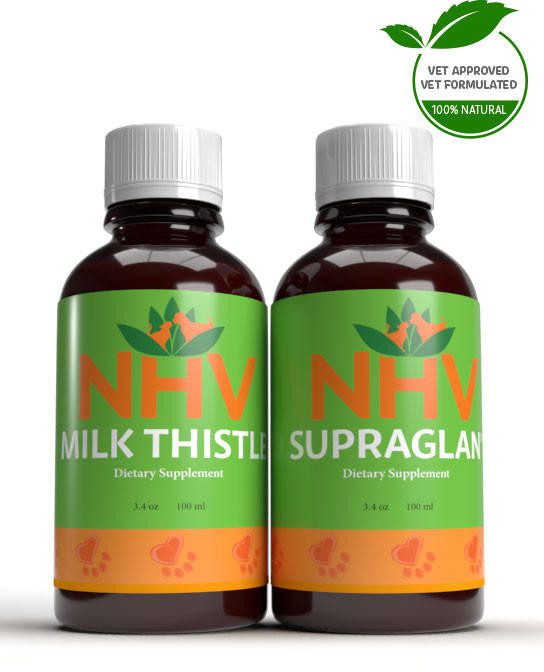
Supraglan & Milk Thistle to Support Dog & Pet Cushing's Disease
bundle and save with pet expert kits
3 month supply for a small to medium size pet.
What is it?
This kit of NHV Supraglan and NHV Milk Thistle may support healthy adrenal gland function, liver enzyme levels, and help your pet to fight infections.
How Does it Work?
Why Should I Trust It?
Natural vet-formulated herbal supplements.

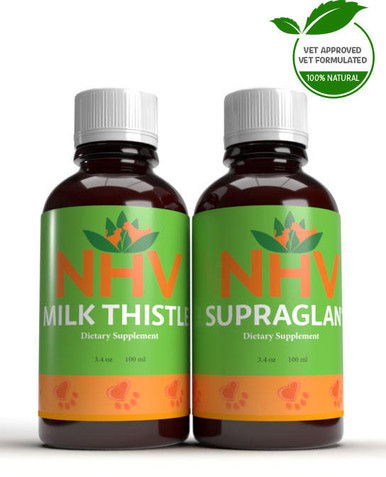
What is it?
This kit of NHV Supraglan and NHV Milk Thistle may support healthy adrenal gland function, liver enzyme levels, and help your pet to fight infections.
How Does it Work?
Why Should I Trust It?
Natural vet-formulated herbal supplements.

If your cat or dog has Cushing’s disease, the NHV Cushing’s Disease Essentials Kit may be beneficial in supporting your pet's overall health and well-being. The combination of NHV Supraglan and NHV Milk Thistle are vet approved and formulated to work synergistically in supporting their pituitary and adrenal gland, liver, and kidney function.
This kit can be taken alone, or together with the conventional Cushing’s treatment for cats and dogs that your veterinarian prescribes. These all-natural supplements are safe to take long-term.
Dog and cat Cushing’s disease is caused by the overproduction of the hormone cortisol by the adrenal gland. Animals with this disease have a suppressed immune system caused by the excessive production of cortisol in the body and are likely to get bladder infections due to this.
Supraglan is a natural herbal supplement that will help to balance the adrenal gland, improving the immune system and help the body fight infections. It may also aid in reducing thirst, excessive urination, appetite, help overall skin condition, and support the kidneys.
Milk Thistle helps support the liver and kidney function. Test results for animals that have Cushing’s indicated elevated liver enzyme levels and enlargement of the liver. Combing these products will help your pet live a healthy life. Visit our blog to read about other’s success in combating dog and pet Cushing’s disease with this essentials kit. Contact our pet experts if you have questions about options for Cushing’s treatment in cats & dogs.
Borage – Gently strengthens and improves adrenal function, and has been used for urinary issues and kidney inflammation.
Astragalus – Helps support the endocrine system, strengthens the immune system and acts as an anti-inflammatory. It has been found useful in helping the body recover from the effects of steroids, which affects the adrenal gland. Has both antibacterial and antiviral properties that aid your veterinarian’s recommended treatment for Cushing’s in cats & dogs.
Bistorte – A soothing anti-inflammatory that has a tonic effect on the liver and kidneys. In herbal medicine, it has been used to aid in urinary tract infections.
Eleuthero – A root that supports adrenal gland function, helps boost a sluggish metabolism, helps improve energy, and studies have shown that it improves the immune system.
Wild Yam – An herb that acts as a liver tonic, and helps normalize hormone production and kidney support. It helps with restlessness and nervousness.
Licorice – An herb that prevents the breakdown of the adrenal hormones. Improves digestion, helps boost immunity levels, and supports liver function.
Dandelion – A highly nutritious food that stimulates liver secretions, kidney function and improves digestion. High in natural vitamins and minerals.
Milk Thistle – In herbal medicine, this herb has been used for centuries to support, regenerate and remove toxins from the liver. Milk Thistle contains silymarin - a compound that protects the liver and stimulates, the production of new cells. It has powerful antioxidant properties, which helps strengthen the liver's resistance to toxic compounds. A healthy liver can be key to the treatment of Cushing’s disease in dogs and pets.
In pets, Milk Thistle is beneficial for damaged kidneys, as it has been shown to decrease the amount of time to heal while helping eliminate toxins.
Select your pet's weight to determine the correct dose.
To be taken twice daily. Determine your pet’s weight and then use the easy chart below to determine the correct dose. This is the minimum dosage.
Pet's Weight Dosage
0 - 15 lb = 0.5 ml
16 - 30 lb = 1.0 ml
31 - 45 lb = 1.5 ml
46 - 60 lb = 2.0 ml
61 - 75 lb = 2.5 ml
Over 75 lb = 3.0 ml
How to Administer
Refrigerate after opening.
Shake well. The easiest method is to use the dropper provided and place Supraglan and Milk Thistle drops into your dogs food or favorite treat. You can also use the dropper and squirt directly into the dogs mouth.
For Best Results
Herbal dietary supplements are beneficial to the health and well-being of your canine and are safe for long-term use. Every pet dog responds to natural herbal supplements differently, therefore it is important to be consistent and administer the product daily. Supplements generally take two to four weeks to take effect, however this will vary from one animal to the next.
Product Storage
All NHV Natural Pet Products are pure herbal extracts and contain no artificial additives, preservatives or coloring. Shelf life after opening is 6 months and must be refrigerated after opening.
Cautions and Contraindications
Do not use Supraglan in pregnant or nursing animals.
All information provided by NHV Natural Pet Products is for educational purposes only.
If your cat or dog has Cushing’s disease, the NHV Cushing’s Disease Essentials Kit may be beneficial in supporting your pet's overall health and well-being. The combination of NHV Supraglan and NHV Milk Thistle are vet approved and formulated to work synergistically in supporting their pituitary and adrenal gland, liver, and kidney function.
This kit can be taken alone, or together with the conventional Cushing’s treatment for cats and dogs that your veterinarian prescribes. These all-natural supplements are safe to take long-term.
Dog and cat Cushing’s disease is caused by the overproduction of the hormone cortisol by the adrenal gland. Animals with this disease have a suppressed immune system caused by the excessive production of cortisol in the body and are likely to get bladder infections due to this.
Supraglan is a natural herbal supplement that will help to balance the adrenal gland, improving the immune system and help the body fight infections. It may also aid in reducing thirst, excessive urination, appetite, help overall skin condition, and support the kidneys.
Milk Thistle helps support the liver and kidney function. Test results for animals that have Cushing’s indicated elevated liver enzyme levels and enlargement of the liver. Combing these products will help your pet live a healthy life. Visit our blog to read about other’s success in combating dog and pet Cushing’s disease with this essentials kit. Contact our pet experts if you have questions about options for Cushing’s treatment in cats & dogs.
Borage – Gently strengthens and improves adrenal function, and has been used for urinary issues and kidney inflammation.
Astragalus – Helps support the endocrine system, strengthens the immune system and acts as an anti-inflammatory. It has been found useful in helping the body recover from the effects of steroids, which affects the adrenal gland. Has both antibacterial and antiviral properties that aid your veterinarian’s recommended treatment for Cushing’s in cats & dogs.
Bistorte – A soothing anti-inflammatory that has a tonic effect on the liver and kidneys. In herbal medicine, it has been used to aid in urinary tract infections.
Eleuthero – A root that supports adrenal gland function, helps boost a sluggish metabolism, helps improve energy, and studies have shown that it improves the immune system.
Wild Yam – An herb that acts as a liver tonic, and helps normalize hormone production and kidney support. It helps with restlessness and nervousness.
Licorice – An herb that prevents the breakdown of the adrenal hormones. Improves digestion, helps boost immunity levels, and supports liver function.
Dandelion – A highly nutritious food that stimulates liver secretions, kidney function and improves digestion. High in natural vitamins and minerals.
Milk Thistle – In herbal medicine, this herb has been used for centuries to support, regenerate and remove toxins from the liver. Milk Thistle contains silymarin - a compound that protects the liver and stimulates, the production of new cells. It has powerful antioxidant properties, which helps strengthen the liver's resistance to toxic compounds. A healthy liver can be key to the treatment of Cushing’s disease in dogs and pets.
In pets, Milk Thistle is beneficial for damaged kidneys, as it has been shown to decrease the amount of time to heal while helping eliminate toxins.
Select your pet's weight to determine the correct dose.
To be taken twice daily. Determine your pet’s weight and then use the easy chart below to determine the correct dose. This is the minimum dosage.
Pet's Weight Dosage
0 - 15 lb = 0.5 ml
16 - 30 lb = 1.0 ml
31 - 45 lb = 1.5 ml
46 - 60 lb = 2.0 ml
61 - 75 lb = 2.5 ml
Over 75 lb = 3.0 ml
How to Administer
Refrigerate after opening.
Shake well. The easiest method is to use the dropper provided and place Supraglan and Milk Thistle drops into your dogs food or favorite treat. You can also use the dropper and squirt directly into the dogs mouth.
For Best Results
Herbal dietary supplements are beneficial to the health and well-being of your canine and are safe for long-term use. Every pet dog responds to natural herbal supplements differently, therefore it is important to be consistent and administer the product daily. Supplements generally take two to four weeks to take effect, however this will vary from one animal to the next.
Product Storage
All NHV Natural Pet Products are pure herbal extracts and contain no artificial additives, preservatives or coloring. Shelf life after opening is 6 months and must be refrigerated after opening.
Cautions and Contraindications
Do not use Supraglan in pregnant or nursing animals.
All information provided by NHV Natural Pet Products is for educational purposes only.
adrenal support
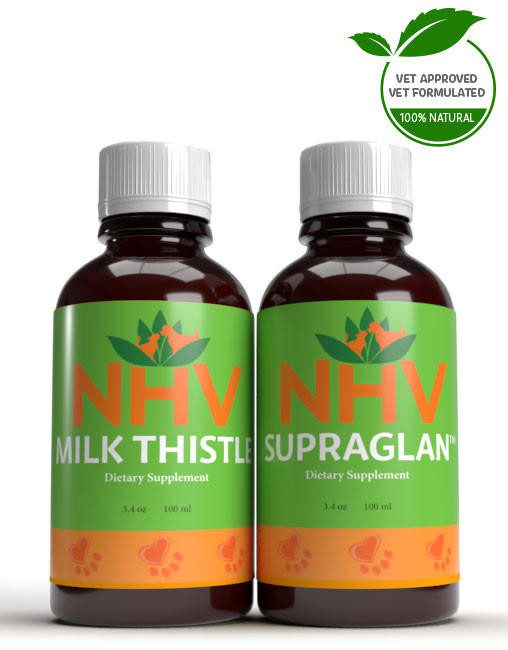
Milk Thistle & Supraglan
bundle and save with pet expert kits
3 month supply for a small to medium size pet.
What is it?
NHV's Addison's Disease Essential Support Kit is formulated to fight the symptoms of Addison's disease in dogs and cats and support all areas affected by underactive adrenal glands.
How Does it Work?
Why Should I Trust It?
100% natural supplements, formulated by veterinarians.

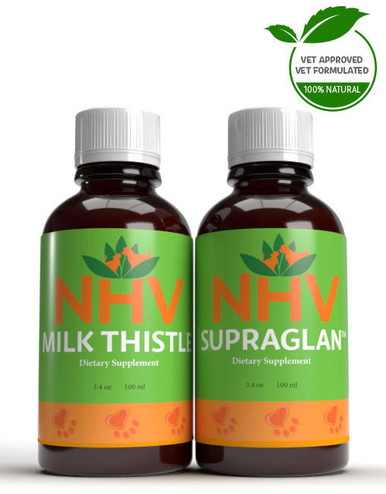
What is it?
NHV's Addison's Disease Essential Support Kit is formulated to fight the symptoms of Addison's disease in dogs and cats and support all areas affected by underactive adrenal glands.
How Does it Work?
Why Should I Trust It?
100% natural supplements, formulated by veterinarians.

Addison’s disease affects many areas of the body and can be mistaken for normal signs of aging. If your furkiddo isn’t keeping their meals down, is feeling lethargic and is losing weight, they may be suffering from Addison’s disease. Our adrenal supplement kits are specifically formulated to fight the symptoms of Addison's disease in dogs and cats and support all areas affected by underactive adrenal glands.
Addison’s Disease or hypoadrenocorticism occurs when the adrenal glands do not produce enough hormones. The adrenal glands are located just in front of the kidneys and have two parts – the cortex and the medulla. Your little one’s adrenal cortex produces mineralocorticoids (e.g. Aldosterone), which helps to control the balance of sodium and potassium salts, and glucocorticoids, which are involved in metabolizing nutrients, reducing inflammation and releasing hormones like estrogen and progesterone. The adrenal medulla plays a vital role in managing the body’s response to stress and low blood sugar levels. It releases epinephrine (adrenaline) and norepinephrine, which increase heart rate, blood pressure, blood glucose levels and slowing down digestion.
Addison’s Disease (underactive adrenal glands) occurs more frequently in young to middle-aged pups and in some purebred kitties. Dog breeds that may be more likely to develop Addison’s disease are: Standard Poodles, Great Danes, Bearded Collies, Portuguese Water Dogs and West Highland White Terriers. Although the cause is unknown, in many cases, it develops as an autoimmune disease. Other causes include destruction of the adrenal gland by a tumor, hemorrhage or infarction. It can also be caused by vet-prescribed medications for treating overactive adrenal glands (Cushing's disease).
Symptoms include regular vomiting, decreased appetite, weight loss, and sometimes dark diarrhea. Lethargy, depression, and muscle weakness are also common signs. Sometimes fur loss, and increased urination are present as well. For canines and felines Addison’s Disease in , we'd suggest adding NHV’s Addison’s Disease Essential Support Kit to their daily meal plan. This bundle of natural remedies contains Supraglan, and Milk thistle which have been formulated to work together to re-balance the adrenal glands, reduce inflammation, and encourage gentle detoxification and tissue regeneration.
An adrenal gland disorder impacts many areas of the body and can be easily mistaken for natural signs of aging. We would recommend a holistic aid specifically for Addison’s disease in dogs and cats that provides multiple organ support as well as gently stimulate the endocrine system. Suplaglan is a blend of natural ingredients specially formulated to support dogs and cats with Addison's Disease. Wild Yam and Licorice stimulate adrenal gland function, while Borage contains natural precursors of adrenal gland hormones to help trigger the endocrine system. Suplaglan also contains many ingredients with anti-inflammatory and antioxidant properties that support healthy liver, kidney and immune response. Milk Thistle provides additional support to the liver and kidneys and is especially helpful for pets with a compromised immune system or exposure to harmful chemicals.
Your pet’s health means everything to us. For our Addison’s Disease pet support kit, we believe in taking an integrative approach that connects and aids each of the affected areas while minimizing side effects. Our all-natural liquid formulation makes it easy to hide in food or a favorite treat. For any questions or concerns about your little one’s adrenal health, we are always happy to help. Please do not hesitate to reach out to an NHV pet expert.
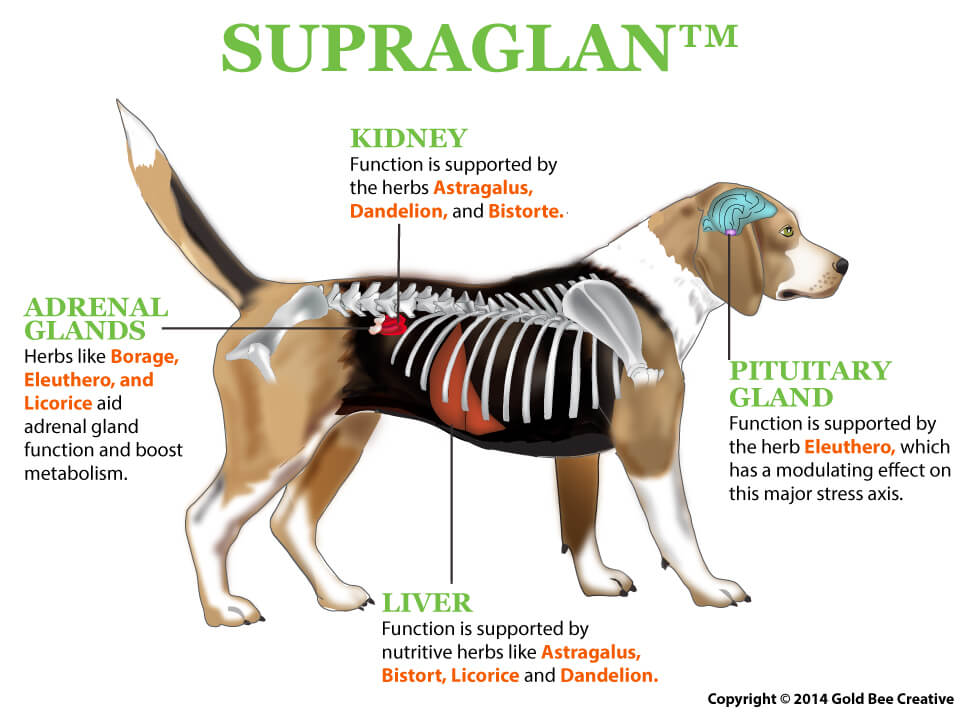
Made with the finest, organically grown, or ethically harvested herbs. Made specifically for pets, vet-formulated and vet approved.
Supraglan
Milk Thistle
Select your pet's weight to determine the correct dose.
To be taken twice daily. Determine your pet’s weight and then use the easy chart below to determine the correct dose. This is the minimum dosage.
Pet's Weight Dosage
0 - 15 lb = 0.5 ml
16 - 30 lb = 1.0 ml
31 - 45 lb = 1.5 ml
46 - 60 lb = 2.0 ml
61 - 75 lb = 2.5 ml
Over 75 lb = 3.0 ml
For small animals (rabbits, ferrets), avians and reptiles use 1 drop for every 2 lb of body weight.
How to Administer
Shake well before use. The easiest method is to use the dropper provided and place the drops into your pet’s food or favorite treat. You can also use the dropper and squirt directly into the pet’s mouth. Some pets can be finicky, if this occurs consider hiding the drops in foods most pet’s love such as fish, chicken or yogurt or a favorite treat. If your pet only eats dry food then soak a few kibbles at feeding time.
For Best Results
Herbal dietary supplements are beneficial to the health and well-being of your pet and are safe for long-term use. Every pet responds to natural herbal supplements differently, therefore it is important to be consistent and administer the product daily. Supplements generally take two to four weeks to take effect, however this will vary from one animal to the next.
Product Storage
All NHV Natural Pet Products are pure herbal extracts and contain no artificial additives, preservatives or coloring. Shelf life after opening is 6 months and must be refrigerated after opening.
Cautions and Contraindications
Do not use Supraglan in pregnant or nursing animals. Speak to your vet before using our products. A second visit is recommended if your pet’s condition does not improve, or deteriorates after continued use of the supplements.
All information provided by NHV Natural Pet Products is for educational purposes only.
Addison’s disease affects many areas of the body and can be mistaken for normal signs of aging. If your furkiddo isn’t keeping their meals down, is feeling lethargic and is losing weight, they may be suffering from Addison’s disease. Our adrenal supplement kits are specifically formulated to fight the symptoms of Addison's disease in dogs and cats and support all areas affected by underactive adrenal glands.
Addison’s Disease or hypoadrenocorticism occurs when the adrenal glands do not produce enough hormones. The adrenal glands are located just in front of the kidneys and have two parts – the cortex and the medulla. Your little one’s adrenal cortex produces mineralocorticoids (e.g. Aldosterone), which helps to control the balance of sodium and potassium salts, and glucocorticoids, which are involved in metabolizing nutrients, reducing inflammation and releasing hormones like estrogen and progesterone. The adrenal medulla plays a vital role in managing the body’s response to stress and low blood sugar levels. It releases epinephrine (adrenaline) and norepinephrine, which increase heart rate, blood pressure, blood glucose levels and slowing down digestion.
Addison’s Disease (underactive adrenal glands) occurs more frequently in young to middle-aged pups and in some purebred kitties. Dog breeds that may be more likely to develop Addison’s disease are: Standard Poodles, Great Danes, Bearded Collies, Portuguese Water Dogs and West Highland White Terriers. Although the cause is unknown, in many cases, it develops as an autoimmune disease. Other causes include destruction of the adrenal gland by a tumor, hemorrhage or infarction. It can also be caused by vet-prescribed medications for treating overactive adrenal glands (Cushing's disease).
Symptoms include regular vomiting, decreased appetite, weight loss, and sometimes dark diarrhea. Lethargy, depression, and muscle weakness are also common signs. Sometimes fur loss, and increased urination are present as well. For canines and felines Addison’s Disease in , we'd suggest adding NHV’s Addison’s Disease Essential Support Kit to their daily meal plan. This bundle of natural remedies contains Supraglan, and Milk thistle which have been formulated to work together to re-balance the adrenal glands, reduce inflammation, and encourage gentle detoxification and tissue regeneration.
An adrenal gland disorder impacts many areas of the body and can be easily mistaken for natural signs of aging. We would recommend a holistic aid specifically for Addison’s disease in dogs and cats that provides multiple organ support as well as gently stimulate the endocrine system. Suplaglan is a blend of natural ingredients specially formulated to support dogs and cats with Addison's Disease. Wild Yam and Licorice stimulate adrenal gland function, while Borage contains natural precursors of adrenal gland hormones to help trigger the endocrine system. Suplaglan also contains many ingredients with anti-inflammatory and antioxidant properties that support healthy liver, kidney and immune response. Milk Thistle provides additional support to the liver and kidneys and is especially helpful for pets with a compromised immune system or exposure to harmful chemicals.
Your pet’s health means everything to us. For our Addison’s Disease pet support kit, we believe in taking an integrative approach that connects and aids each of the affected areas while minimizing side effects. Our all-natural liquid formulation makes it easy to hide in food or a favorite treat. For any questions or concerns about your little one’s adrenal health, we are always happy to help. Please do not hesitate to reach out to an NHV pet expert.

Made with the finest, organically grown, or ethically harvested herbs. Made specifically for pets, vet-formulated and vet approved.
Supraglan
Milk Thistle
Select your pet's weight to determine the correct dose.
To be taken twice daily. Determine your pet’s weight and then use the easy chart below to determine the correct dose. This is the minimum dosage.
Pet's Weight Dosage
0 - 15 lb = 0.5 ml
16 - 30 lb = 1.0 ml
31 - 45 lb = 1.5 ml
46 - 60 lb = 2.0 ml
61 - 75 lb = 2.5 ml
Over 75 lb = 3.0 ml
For small animals (rabbits, ferrets), avians and reptiles use 1 drop for every 2 lb of body weight.
How to Administer
Shake well before use. The easiest method is to use the dropper provided and place the drops into your pet’s food or favorite treat. You can also use the dropper and squirt directly into the pet’s mouth. Some pets can be finicky, if this occurs consider hiding the drops in foods most pet’s love such as fish, chicken or yogurt or a favorite treat. If your pet only eats dry food then soak a few kibbles at feeding time.
For Best Results
Herbal dietary supplements are beneficial to the health and well-being of your pet and are safe for long-term use. Every pet responds to natural herbal supplements differently, therefore it is important to be consistent and administer the product daily. Supplements generally take two to four weeks to take effect, however this will vary from one animal to the next.
Product Storage
All NHV Natural Pet Products are pure herbal extracts and contain no artificial additives, preservatives or coloring. Shelf life after opening is 6 months and must be refrigerated after opening.
Cautions and Contraindications
Do not use Supraglan in pregnant or nursing animals. Speak to your vet before using our products. A second visit is recommended if your pet’s condition does not improve, or deteriorates after continued use of the supplements.
All information provided by NHV Natural Pet Products is for educational purposes only.
Published: April 18, 2025